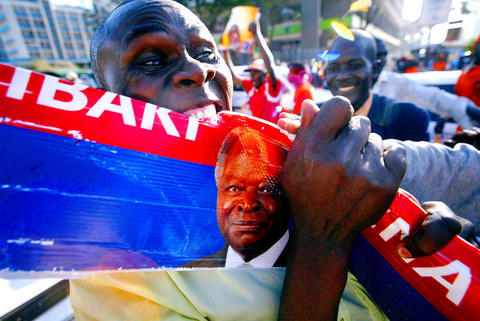In the Kenyan slum of Kibera these days, the ancient cadences of the Muslim call to prayer compete with election propaganda blaring from loudspeakers.
With opposition candidate Raila Odinga holding onto a razor-thin lead over incumbent Kenyan President Mwai Kibaki, every pollster describes tomorrow's race as too close to call. It's a rare tight race on a continent where sitting presidents are usually re-elected, and in a country where an incumbent has never before faced a credible challenge.
Kenya's 3.5 million Muslims -- out of a population of 34 million -- may be the deciding factor.

PHOTO: AFP
"It's the first time that religious issues have played such a prominent part in national politics," said Karuti Kanyinga, a political scientist at the University of Nairobi's Institute for Development Studies. "Because the race is so close, candidates are looking for any issue that may pull voters over to their side."
And so, a campaign that has featured promises to clean up Kenya's notoriously corrupt government, thinly veiled appeals to tribal loyalties -- crowds of people supporting the rival candidates shouted tribal epithets and threw rocks at each other during rallies on Monday, prompting police to fire tear gas -- and bouts of violence have also focused to an unusual degree on Muslim grievances.
There are perceptions among Muslims they are being targeted in a war on terror in which Kibaki has allowed terror suspects to be deported from Kenya and sent to neighboring Ethiopia for questioning, in some cases by US agents. There are also concerns about delays in granting mainly Muslim ethnic minorities national identity cards, without which they cannot work, vote or own land and the constant poverty in the slums and along Kenya's coastline, where many residents are Muslim.
When Odinga signed an agreement in August with one leading Muslim forum promising to end the deportations and launch an inquiry into the issue, it dominated headlines for days.
Kibaki, who has said little about the deportations, responded in October by setting up a committee dedicated to looking at Muslim grievances, including the deportations.
An investigation by The Associated Press earlier this year confirmed some terror suspects were being deported to Ethiopia for questioning. Human rights activists have criticized the Ethiopian government's human rights record.
Saidi Osman of the National Muslim Leaders Forum said that before Kibaki "no president in Kenya or Africa had removed citizens of his country to another country without due process."
After widely publicized protests over the deportations, "Muslims in Kenya have decided to punish Kibaki and vote him out," Osman said.
Sheik Mohamed Dor, secretary-general of the Council of Imams and Preachers of Kenya, has taken the lead in organizing Muslim voters and demanded that candidates address the community's concerns.
"For the last 40 years Muslims did not take the issue of voting seriously. But the trend is changing now," Dor said.
He established the council in 1997 as a religious group and to educate people on their rights and the importance of voting.
In Kibera, a key battleground and Odinga's home constituency, the Nubian community is less worried about deportations than government delays in processing their identity cards and land titles.
Many members of the 200,000 Nubian community are descended from Muslim Sudanese soldiers who served in the British colonial army. Despite being entitled to citizenship because their families have lived in Kenya for generations, many still lack identity documents that would allow them to vote or own land.
The government insists that progress is being made, pointing to attempts to streamline the process of identification cards.
But for Kenyan Muslims without documents, the arguments make little impact.
"The government should know that it is not doing favors for minorities when giving them IDs, birth certificates and passports," said Al-Amin Kimathi of the Muslim Human Rights Forum. "It is their rights."

‘CHILD PORNOGRAPHY’: The doll on Shein’s Web site measure about 80cm in height, and it was holding a teddy bear in a photo published by a daily newspaper France’s anti-fraud unit on Saturday said it had reported Asian e-commerce giant Shein (希音) for selling what it described as “sex dolls with a childlike appearance.” The French Directorate General for Competition, Consumer Affairs and Fraud Control (DGCCRF) said in a statement that the “description and categorization” of the items on Shein’s Web site “make it difficult to doubt the child pornography nature of the content.” Shortly after the statement, Shein announced that the dolls in question had been withdrawn from its platform and that it had launched an internal inquiry. On its Web site, Le Parisien daily published a

China’s Shenzhou-20 crewed spacecraft has delayed its return mission to Earth after the vessel was possibly hit by tiny bits of space debris, the country’s human spaceflight agency said yesterday, an unusual situation that could disrupt the operation of the country’s space station Tiangong. An impact analysis and risk assessment are underway, the China Manned Space Agency (CMSA) said in a statement, without providing a new schedule for the return mission, which was originally set to land in northern China yesterday. The delay highlights the danger to space travel posed by increasing amounts of debris, such as discarded launch vehicles or vessel

RUBBER STAMP? The latest legislative session was the most productive in the number of bills passed, but critics attributed it to a lack of dissenting voices On their last day at work, Hong Kong’s lawmakers — the first batch chosen under Beijing’s mantra of “patriots administering Hong Kong” — posed for group pictures, celebrating a job well done after four years of opposition-free politics. However, despite their smiles, about one-third of the Legislative Council will not seek another term in next month’s election, with the self-described non-establishment figure Tik Chi-yuen (狄志遠) being among those bowing out. “It used to be that [the legislature] had the benefit of free expression... Now it is more uniform. There are multiple voices, but they are not diverse enough,” Tik said, comparing it

Prime ministers, presidents and royalty on Saturday descended on Cairo to attend the spectacle-laden inauguration of a sprawling new museum built near the pyramids to house one of the world’s richest collections of antiquities. The inauguration of the Grand Egyptian Museum, or GEM, marks the end of a two-decade construction effort hampered by the Arab Spring uprisings, the COVID-19 pandemic and wars in neighboring countries. “We’ve all dreamed of this project and whether it would really come true,” Egyptian Prime Minister Mostafa Madbouly told a news conference, calling the museum a “gift from Egypt to the whole world from a